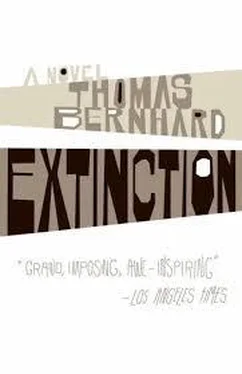lover, and a note from Maria. I immediately threw the invitations from various Roman cultural institutes and all the other private invitations into the wastepaper bin, together with a few letters that a cursory inspection revealed as begging or threatening, letters written by people who either wanted money from me or demanded to know what I was trying to achieve by my lifestyle and my way of thinking. They referred to a few newspaper articles I had published recently, which naturally did not suit the writers because they had been directed against all such people — people in Austria, of course, whose hatred pursued me as far as Rome. I have been getting such letters for years. The writers are not madmen, as I had at first believed, but individuals who are legally responsible — fit to plead, so to speak — yet who react to my publications in various newspapers and magazines, not only in Frankfurt and Hamburg but in Milan and Rome, by threatening me with, among other things, prosecution and death. I am always dragging Austria in the dirt, they say, denigrating my own country in the most outrageous fashion and crediting the Austrians with base and despicable Catholic and National Socialist opinions whenever and wherever I can, whereas according to the writers, no such base and despicable opinions exist in Austria. Austria is not base and despicable, they say; it has
never been anything but beautiful, and the Austrians are decent people. I always throw these letters away, as I had done that morning. I had kept the letter from Eisenberg, a college friend who is now a rabbi in Vienna, telling me that he had to be in Venice at the end of May and inviting me to meet him there. He intended to take me to the Teatro Fenice — not to see anything like Stravinsky’s
Soldier’s Tale, which we had seen the previous year, but to see Monteverdi’s
Tancredi. I’ll naturally accept Eisenberg’s invitation, I thought. I’ll write to him at once, but
at once means
after I get back from Wolfsegg. It’s always been a delight to walk through Venice with Eisenberg, I thought. It’s a delight just to be with him. Whenever he comes to Italy, if only for a few days in Venice, he lets me know in advance, I thought, and he always invites me to what he calls an
artistic treat, which a performance of
Tancredi in the Fenice is bound to be, I thought. I had also been sent a copy of the
Corriere della Sera containing my short article on Leoš Janáček. I opened the newspaper expectantly, only to find that my article was not printed in a prominent place — which immediately put me in a bad humor. Moreover, a cursory glance revealed a number of unpardonable printing errors — which is the wont thing that can happen to me. I threw the
Corriere away and reread the note that Maria had dropped in my letter box. My great poet wrote that she wanted to have dinner with me on Saturday,
just with you, she wrote, adding that she had also written some poems—
foryou. My great poet has been quite productive recently, I thought. I opened the drawer in which I kept a few photographs of my family. I looked intently at a picture of my parents at Victoria Station in London, boarding the train for Dover. I had taken it myself, without their knowledge. They had visited me in London in 1960, when I was a student there. After spending two weeks in England and traveling as far as Glasgow and Bristol, they went on to Paris, where my sisters were waiting for them. My sisters had traveled to Paris from Cannes, where they had been staying with my uncle Georg. In 1960 was still on tolerable terms with my parents, I thought. I had wanted to study in England, and they had not opposed the idea, as they must have assumed that after studying in England I would return to Vienna and ultimately to Wolfsegg, in order to fulfill their wish that I join my brother in managing the estate. But even at that time I had no intention of returning to Wolfsegg. I had in fact left Wolfsegg for England and London with the sole thought of never returning to Wolfsegg. I hated agriculture, to which my father and brother were passionately devoted. I hated everything connected with Wolfsegg, where the only thing that mattered was the economic well-being of the family. Nothing else mattered. For as long as Wolfsegg was in my family’s hands, no one had time for anything but maximizing the profits from its production units — its farmland, which even today covers twelve thousand acres, and its mines. They thought of nothing but how best to exploit their property. Of course they always pretended to be taken up with activities other than profitmaking, to be interested in culture and the arts, but the reality was depressing and embarrassing. True, they had thousands of books in their libraries at Wolfsegg — the house has five libraries — and the books were dusted three or four times a year with absurd regularity, but they were never read. The family kept the libraries sparkling in order to be able to display them to visitors without feeling ashamed, to show off and boast about their treasures, but they never made any practical or personal use of these treasures. The five libraries at Wolfsegg, four in the main house and one in an adjacent building, were founded by my great-great-great-grandparents, and my parents never added a single volume to the collections. It is said that our libraries, taken together, are as valuable as the world-famous monastery library at Lambach. My father never read a book. Occasionally my mother would leaf through old scientific works, enjoying the finely colored engravings that adorned their pages. My sisters never visited the libraries at all, except to show them to visitors who expressed a wish to see them. The photograph of my parents taken at Victoria Station shows them at an age when they still traveled widely and were not yet afflicted by illness. They were wearing the raincoats they had just bought at Burberrys, and carrying umbrellas on their arms, also from Burberrys. Like typical continentals, they tried to be more English than the English, and the consequent impression was grotesque rather than refined and elegant. I had to laugh every time I saw this photograph, but now my laughter was gone. My mother’s neck was rather too long to be considered beautiful, and at the moment when I took the photo — as she was getting on the train — it was stretched forward an inch or two more than usual, which made the picture doubly ridiculous. My father’s posture was always that of a man who could not hide his bad conscience from the world and was consequently unhappy. When I took the photo he had his hat pulled down lower than usual over his forehead — which made him look more gauche than he really was. I’ve no idea why I’ve kept this particular photo of my parents, I thought, but one day I’ll discover the reason. I put it on the desk and looked in the drawer for the one I had taken of my brother on the shore of the Wolfgangsee. It showed him on his sailboat, which he kept all year round at Sankt Wolfgang, in a shed rented from the Fürstenbergs. The figure in the picture is an embittered man, ruined by living alone with his parents, and the sporty attire only partly conceals the illnesses that have already taken possession of him. He has a forced smile, as they say, and only his brother — only I — could have taken the photo. When I gave him a copy, he tore it up without saying a word. I now placed the photo of my brother beside that of my parents boarding the Dover train and studied them for a long time. You loved these people as long as they loved you, I told myself, and hated them from the moment they hated you. Naturally I never thought I would outlive them. In fact I always imagined that
I would be the first to die. The present situation is the one situation I’ve
Читать дальше












